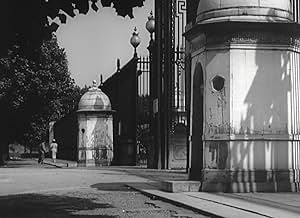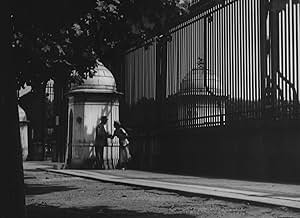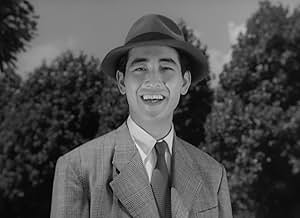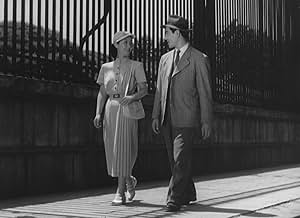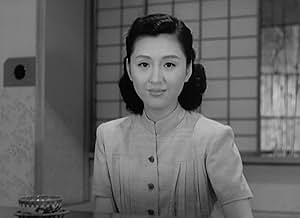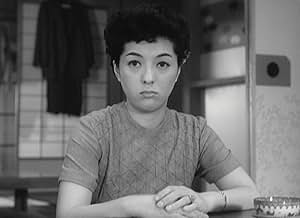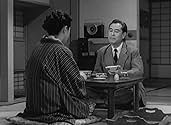CALIFICACIÓN DE IMDb
7.6/10
4.1 k
TU CALIFICACIÓN
Un matrimonio sin hijos se enfrenta a una crisis.Un matrimonio sin hijos se enfrenta a una crisis.Un matrimonio sin hijos se enfrenta a una crisis.
- Dirección
- Guionistas
- Elenco
- Premios
- 1 premio ganado en total
- Dirección
- Guionistas
- Todo el elenco y el equipo
- Producción, taquilla y más en IMDbPro
Opiniones destacadas
Its about a rich family and arranged marriages. Taeko is in an arranged marriage which is not so successful, they communicate very badly and she lies to get out and do fun things with her friends. For her it is easy to lie to the husband as she thinks he is very stupid. Her niece don't want to go on a arranged marriage meet, but decide for herself who she wants to marry probably a sign of the times, the transition from traditional to modern Japan. In other ways also the modern is juxtaposed with the traditional, they wear kimonos as naturally as western style clothes. And her sister is working in a top position as a designer.
As another IMDb reviewer said this is most interesting because of the charming characters. The elegant, but a bit arrogant and selfish Satake Taeko (Kogure Michiyô) had me spellbound from beginning to end. All characters are interesting and the interaction and communication between them make up the movie.
The city itself takes up a small role in the movie as well, something I like a lot. Editing also is very clever at times. Its never ordinary or dull.
As another IMDb reviewer said this is most interesting because of the charming characters. The elegant, but a bit arrogant and selfish Satake Taeko (Kogure Michiyô) had me spellbound from beginning to end. All characters are interesting and the interaction and communication between them make up the movie.
The city itself takes up a small role in the movie as well, something I like a lot. Editing also is very clever at times. Its never ordinary or dull.
This film mines much of the territory of Ozu films, including the complex relationships of the major characters, the resistance of a young lady to agree to an arranged marriage and the aesthetics of everyday living amongst the working classes. The film has two main stories, parallel to each other, running through it: Takeo, who is bored with her husband who is very simple in his needs, lies to him so she can go to a spa with her friends. Their niece, the pretty Setsuko, is the one who is resisting the arranged marriage meeting. How the two stories bisect is typical Ozu, creating conflict and anger. This film is not as good as much of Ozu's output at the time, but that includes "Tokyo Story", "Early Summer" and "Late Spring", which are standout classics. The great Setsuko Hara is not in this film and the equally great Chishu Ryu is a bit player, but I think you'll still find this film worthy of your time. If you haven't seen an Ozu film, start with "Tokyo Story" or "Late Spring" (others too, including "Good Morning" and "Autumn Afternoon") but give this a try. I don't think you will be disappointed.
The Flavour of Green Tea over Rice (Ochazuke no aji) is an Ozu film; a subdued drama analyzing the transformation of Japan post-WWII in small, personal ways. This film follows a childless married couple as they navigate changing traditions, conceptions of marriage, and love. The relationship between the two is strained - the husband is a simple country man who enjoys his country cigarettes, riding in the third class passenger car of trains, and throwing himself into his work with tact and politeness. The wife is a city girl, enjoying spa days, expensive and luxurious decorations, and first class train rides. These two struggle to relate to each other, in a marriage that was set up over a decade ago as an arranged marriage.
The catalyst to this film is when their headstrong niece comes to stay. A product of the new Japan, she is not interested in an arranged marriage, and instead wants to meet someone through dating, and marry for love, not familial status. This is scandalous to both her parents and our married couple. However, the two begin to see each other in a new light, engaging with new ideas, trying new things, and ultimately coming together in a touching and mute scene of culinary exploration and intimacy.
Ozu has a way with scenes. Each scene is meticulously detailed, and dripping with meaning, while maintaining a muted, quite feel. Ozu is, of course, a master of film making of this era, and this film is no different. It poignantly portrays the changing nature of relationships, love and marriage in Japan with subtlety, grace, and beauty. There are many wonderful scenes and shots in this film, and it is an Ozu film worth watching.
Complaints-wise, this film feels much slower then many of Ozu's films, almost to the point of not really moving. This seems to be a stylistic choice that compliments the thesis of the film, but also makes the film a bit distractable at times. Scenes feel like they jump at times, and the chronology of events, while supposed to be clear, is often not, for brief moments.
A wonderful film in many ways that just, barely, lacks the Ozu charm and perfection that is common in films like Tokyo Story, for example. Even so, this is a lovely, sweet and touching film that is easily watchable, and contains many of the charms of Ozu's work. Easy recommendation for fans of Ozu, or fans of quite, small and beautiful stories and dramas.
The catalyst to this film is when their headstrong niece comes to stay. A product of the new Japan, she is not interested in an arranged marriage, and instead wants to meet someone through dating, and marry for love, not familial status. This is scandalous to both her parents and our married couple. However, the two begin to see each other in a new light, engaging with new ideas, trying new things, and ultimately coming together in a touching and mute scene of culinary exploration and intimacy.
Ozu has a way with scenes. Each scene is meticulously detailed, and dripping with meaning, while maintaining a muted, quite feel. Ozu is, of course, a master of film making of this era, and this film is no different. It poignantly portrays the changing nature of relationships, love and marriage in Japan with subtlety, grace, and beauty. There are many wonderful scenes and shots in this film, and it is an Ozu film worth watching.
Complaints-wise, this film feels much slower then many of Ozu's films, almost to the point of not really moving. This seems to be a stylistic choice that compliments the thesis of the film, but also makes the film a bit distractable at times. Scenes feel like they jump at times, and the chronology of events, while supposed to be clear, is often not, for brief moments.
A wonderful film in many ways that just, barely, lacks the Ozu charm and perfection that is common in films like Tokyo Story, for example. Even so, this is a lovely, sweet and touching film that is easily watchable, and contains many of the charms of Ozu's work. Easy recommendation for fans of Ozu, or fans of quite, small and beautiful stories and dramas.
Another sensitive Ozu film about family. In this one, a somewhat upper-class woman resents her more simple, middle-class husband (by arranged marriage), while also encouraging her niece to go to arranged marriage meetings. As always with Ozu, I found an awful lot to like about this movie, but I wasn't quite enamored enough to gush over it. Most of the core cast is superb, although it's not Ozu's usual team (Setsuko Hara is nowhere to be seen, although Chishu Ryu and Chikage Awashima have minor roles). Michiyo Kogure might be a little too nasty, but I have to say it's kind of refreshing to see a less restrained character in an Ozu film. Perhaps the film wraps up too nicely and neatly, going too obviously for a touching moment, but I wouldn't say it's entirely unwarranted. At any rate, I enjoyed the film with its insights and gentle humor.
Ozu continues to unfold a worldview of melancholy joy. Here we are offered an insight of what informs this: the glum husband wants things that are 'intimate, primitive, familiar and relaxed', from his brand of cigarettes to pouring tea over his dinner of rice.
So it seems Ozu gravitates towards his camera and world not from deep introspection or need for formalism but towards an intuition.
The benefit is that he naturally envelops space. He doesn't construct it, each visual scene is a soft pencil-stroke tracing and re-tracing paths as a way of arriving at shape.
Some kind of life emerges. In the scenes of the wife lounging with her friends in a spa around a table with drinks and then lazily feeding the fish in a pond, or the two army buddies reminiscing about a beach in Singapore during war with its palm trees, a melancholy breeze blows through it carrying sense, life, contact, memory, evocation. Individually there are wonderful visual moments here, some of the best in his films.
(In all this, he's in line with the great tea master Rikyu's instructions about serving tea, whose name appears in the film. It should not be a lavish or formal ceremony, but sparse and intimate, looking for spontaneous appreciation of what two people relaxing in each other's presence can inspire. Serving tea is merely the opportunity, the framework for contact.)
The flipside of that intuitive approach is that it's enough for Ozu to sketch as he goes. The idea is that life is a bit like this, apparent only in retrospect. He does have in mind a larger transition: a marriage that has grown cold and distant, the lonely night of breaking them apart and, as the man's flight is unexpectedly cancelled, their coming together again in the empty house.
This is a great great notion, the idea that you can create an entire life and for this to slowly crystallize realization in a single moment between two people. It resembles more clearly than any of his other films where Cassavetes would take this mentality in his Woman.
Ozu had tried this several times. For whatever reason, probably a rushed production, he's not in control of it here. This is the most disjointed of his films, a real mess. The ending is possibly the worst work Ozu has done, the wife now enlightened about the purpose of marriage explaining to the young girl (and through her to young women in the audience).
So it seems Ozu gravitates towards his camera and world not from deep introspection or need for formalism but towards an intuition.
The benefit is that he naturally envelops space. He doesn't construct it, each visual scene is a soft pencil-stroke tracing and re-tracing paths as a way of arriving at shape.
Some kind of life emerges. In the scenes of the wife lounging with her friends in a spa around a table with drinks and then lazily feeding the fish in a pond, or the two army buddies reminiscing about a beach in Singapore during war with its palm trees, a melancholy breeze blows through it carrying sense, life, contact, memory, evocation. Individually there are wonderful visual moments here, some of the best in his films.
(In all this, he's in line with the great tea master Rikyu's instructions about serving tea, whose name appears in the film. It should not be a lavish or formal ceremony, but sparse and intimate, looking for spontaneous appreciation of what two people relaxing in each other's presence can inspire. Serving tea is merely the opportunity, the framework for contact.)
The flipside of that intuitive approach is that it's enough for Ozu to sketch as he goes. The idea is that life is a bit like this, apparent only in retrospect. He does have in mind a larger transition: a marriage that has grown cold and distant, the lonely night of breaking them apart and, as the man's flight is unexpectedly cancelled, their coming together again in the empty house.
This is a great great notion, the idea that you can create an entire life and for this to slowly crystallize realization in a single moment between two people. It resembles more clearly than any of his other films where Cassavetes would take this mentality in his Woman.
Ozu had tried this several times. For whatever reason, probably a rushed production, he's not in control of it here. This is the most disjointed of his films, a real mess. The ending is possibly the worst work Ozu has done, the wife now enlightened about the purpose of marriage explaining to the young girl (and through her to young women in the audience).
¿Sabías que…?
- TriviaAt the start of the film, two characters mention going to see a new film with Jean Marais. The film was most likely Orfeo (1950), which was released in Japan in June 1951.
- Citas
Taeko Satake: Think well before you pick your groom, it's important.
- ConexionesFeatured in David Bordwell on 'The Flavor of Green Tea Over Rice' (2019)
- Bandas sonorasLove's Old Sweet Song
Composed by J.L. Molloy (as James Lyman Molloy)
Selecciones populares
Inicia sesión para calificar y agrega a la lista de videos para obtener recomendaciones personalizadas
- How long is The Flavor of Green Tea Over Rice?Con tecnología de Alexa
Detalles
- Fecha de lanzamiento
- País de origen
- Idioma
- También se conoce como
- The Flavor of Green Tea Over Rice
- Locaciones de filmación
- Productora
- Ver más créditos de la compañía en IMDbPro
- Tiempo de ejecución1 hora 56 minutos
- Color
- Mezcla de sonido
- Relación de aspecto
- 1.37 : 1
Contribuir a esta página
Sugiere una edición o agrega el contenido que falta

